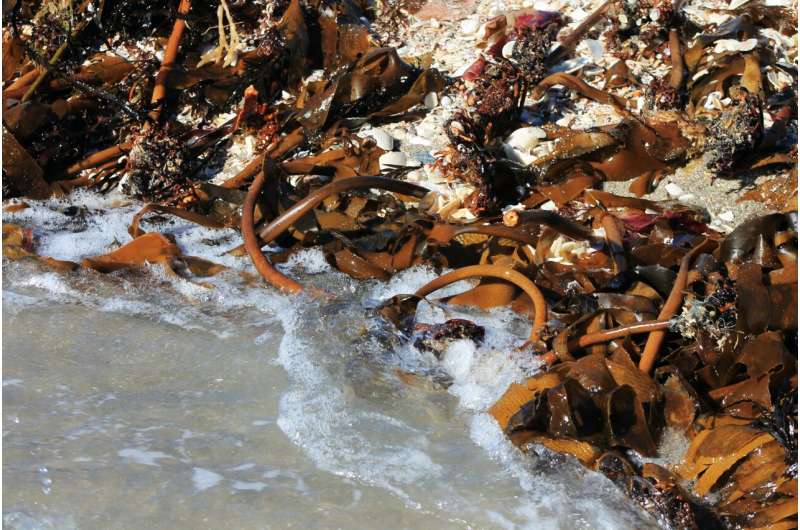This article has been reviewed according to Science X's editorial process and policies. Editors have highlighted the following attributes while ensuring the content's credibility:
fact-checked
trusted source
proofread
Aotearoa's kelp forests at risk, study shows

New research from Te Herenga Waka—Victoria University of Wellington shows warming waters are putting kelp forests in danger.
The study, published open access in the New Zealand Journal of Botany, was led by Dr. Christopher Cornwall from the University's School of Biological Sciences.
Dr. Cornwall says New Zealand's "iconic" seaweed communities are "economically, environmentally, and culturally crucial."
"Seaweed ecosystems, including kelp forests, are our most important undersea nurseries and habitats. They provide food, shelter, and other ecological services to species such as pāua, kina, and koura (crayfish), as well as an array of fin-fish species—including moki, blue cod, and snapper.
"All these species will suffer, or cease to exist in some cases, if seaweed ecosystems die."
Ocean warming has driven increasing frequencies, durations, and intensities of marine heat waves both globally and in Aotearoa, while ocean acidification has also increased. But until now, most information about the effects on New Zealand's undersea ecosystems has not been synthesized.
With a team of internationally recognized scientists from throughout Aotearoa, Dr. Cornwall investigated the effects of four stressors on seaweed ecosystems: marine heat waves, coastal darkening, ocean warming, and ocean acidification.
He says in most cases, the disruption each of these stressors could have will likely be irreversible.
"Our conclusions show the range and health of many of our seaweed species will shift, with sensitive species such as giant kelp most affected.
"Once they're gone, it will be very difficult to restore ecosystems back to how they were."
Previous research by Dr. Cornwall observed similar effects from warming waters on the world's coral reef ecosystems.
"We've seen a lot of damage already with mass coral bleaching events caused by marine heat waves. Corals' ability to persist and continue growing will be strongly influenced by ongoing warming."
Dr. Cornwall says urgent action is needed.
"I think the majority of the public have no idea of the magnitude of what is approaching. Seaweed forests may not receive as much attention globally as coral reefs, but they are just as important and just as at risk.
"We need better marine protection policies, including protection from overfishing beyond marine reserves and proper ecosystem-based management at the reef level. Alongside this, we need restoration efforts that attempt to breed more temperature and low-light resistant species—without this, the prognosis is not great."
More information: Christopher E. Cornwall et al, Predicting the impacts of climate change on New Zealand's seaweed-based ecosystems, New Zealand Journal of Botany (2023). DOI: 10.1080/0028825X.2023.2245786
Provided by Victoria University of Wellington



















